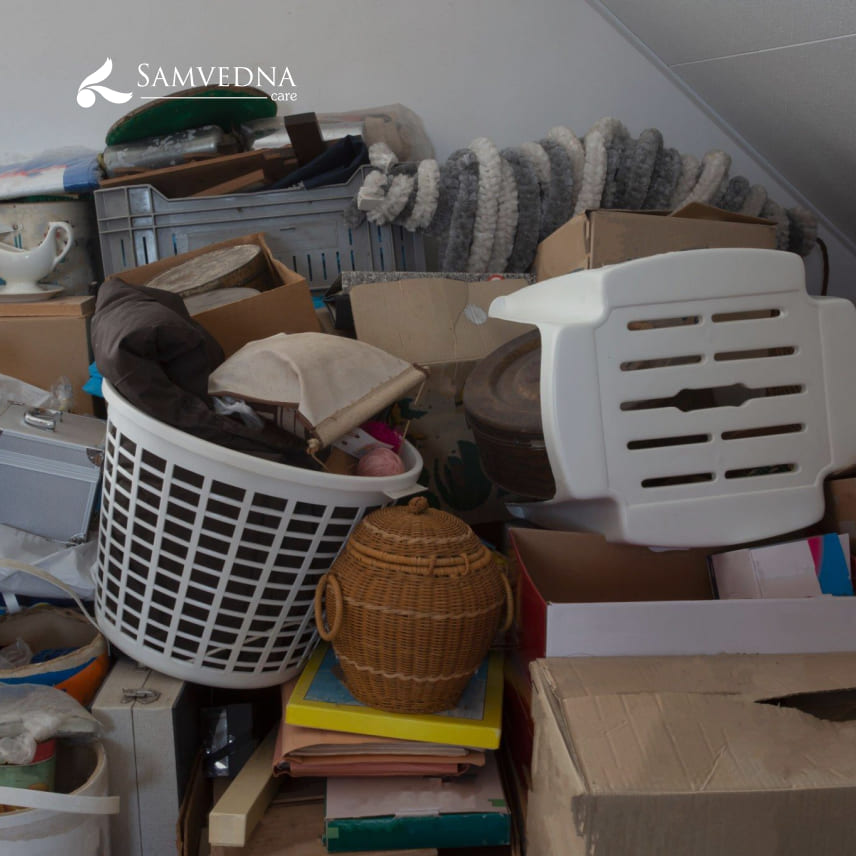Being a caregiver for a person who requires dementia care services is an extremely challenging job since it is a condition where the person progressively deteriorates. However, many secondary problems like hoarding by dementia patients can make it even more difficult for the loved ones caring for them and could increase their caregiver burden.
A high level of caregiver burden has been associated with an increased risk of stress, depression, and isolation among caregivers of people with dementia diagnosis. Hoarding is the behaviour of collecting endless items that most people would consider useless such as rotten food, newspaper cuttings, plastic bags, expired medications etc.
A person with Dementia may hoard items and refuse to throw them out even if it has no value for multiple reasons:
- It gives them a sense of control, and security in their surroundings in times of growing mental confusion.
- Seeing those objects may give them a sense of comfort.
- Another reason could be that they are not able to judge which item is to be kept and which can be thrown away making rooms in a house impossible to use for their actual purpose.
- They may also buy items in multiple quantities and then forget about them.
- Boredom, loneliness and lack of any meaningful engagement throughout the day could also lead to hoarding behaviour.
As dementia progresses, the ability to make healthy decisions decreases and hoarding can pose serious hazards to the affected person and even caregivers such as a rise in falls, illness or other emergencies leading to increased caregiver burden.
Managing hoarding behaviour in persons with dementia can be a real challenge and one will have to try different ways to find the technique which works best for your loved one. Samvedna Care suggests some strategies to manage this behaviour:
- Remain calm and gentle: Being a caregiver you may try to clear out everything at once. However, this might cause distress to people with dementia. Only remove what is needed to eliminate safety and health hazards. Leave behind as much safe clutter as you can. Avoid using harsh statements and remember that your loved one is not doing this on purpose. Your attention should be on discarding as much as you need to make the area safe.
- Replace hazardous objects with safe alternatives: There could be a situation where your loved one might be adamant and refuses to let go of some items. In such situations, caregivers can replace dangerous items such as a sharp knife with a plastic one, a broken glass bowl with a new one and rotten vegetables can be changed with fresh greens. Discard the hazardous objects in a place where the elderly cannot rummage through the garbage.
- Focus on the person: Do not forget that hoarding is just one aspect, try to look beyond the accumulation of items and look for other ways of relating to them. Bonding over their other interests, and highlighting their strengths can help nurture trust and cooperation.
- Meaningful engagements: Redirect their attention to more interesting and stimulating exercises such as labelling old files, sorting photographs, organising clothes etc. These will help in reducing their focus on hoarding things. Samvedna Care provides dementia care services which provide meaningful engagement to help improve their quality of life.
- Involve them in the process: Engage your loved one in short tasks such as sorting the pile of clothes or other goods in boxes like donate, personal use and junk items instead of saying that you will throw them away. People are more willing to discard the items if they are doing it for a good cause, giving things for donation will also give them a sense of empowerment. Also, as highlighted earlier, once they discard the items, get rid of those things immediately as they might search for them in the garbage and get them back to the house.
It will be challenging at times, however, patience, creative ideas, realistic goals and a sense of humour can help manage the hoarding behaviour. Samvedna Care provides a caregiver enablement program that can help caregivers understand and better management of dementia symptoms, reducing caregiver burden. Caregivers can also evaluate their stress levels and can get daily self-care tips to improve their own well-being by signing in at https://map.samvednacare.com/.



